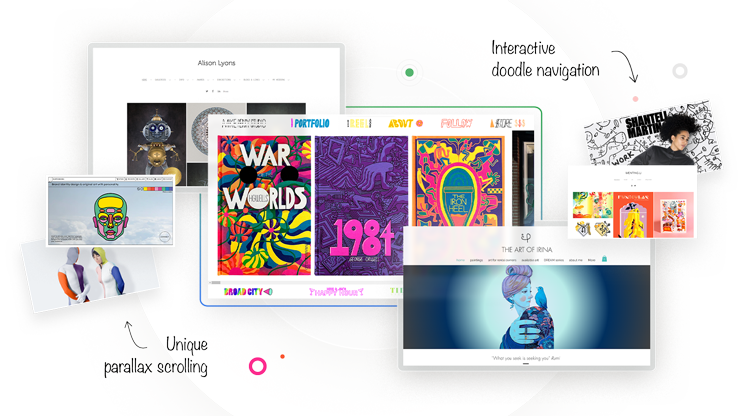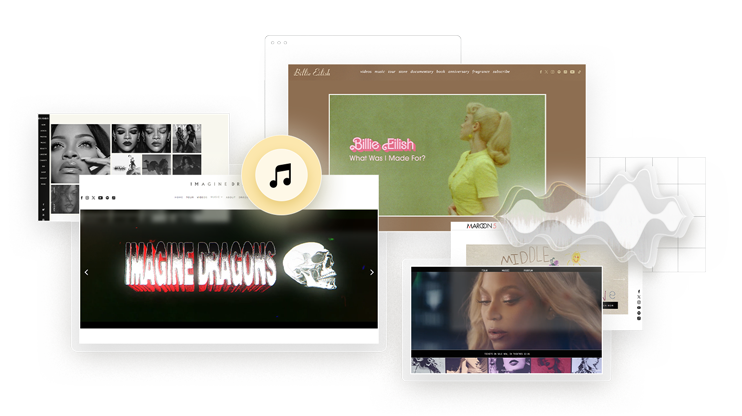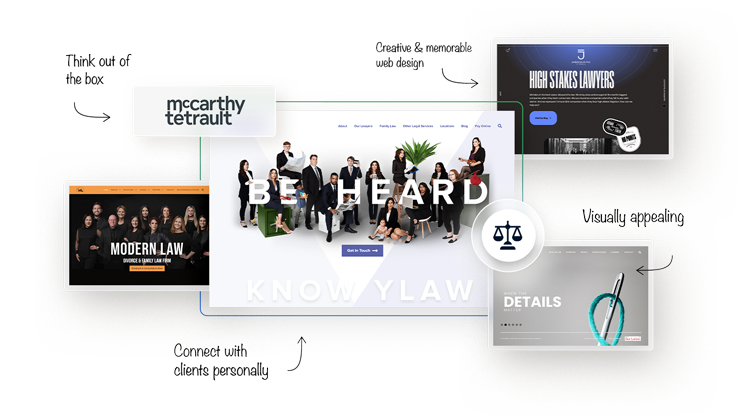Launching your first real estate website, designing for a client, or just exploring what’s possible in the real estate market? A great online presence is a game-changer.
A real estate website shouldn’t be complicated or expensive to be effective․ It’s your ticket to more customers. It helps people find you (hello, local search), builds trust, and makes it super easy for clients to reach out․ In the end, there is no better way to attract people to your real estate business or showcase properties than a great online presence.
We know budget and tech concerns can make this process feel intimidating, but don’t worry, this guide is here to help you through it. We’ve gathered some of the best real estate website examples, along with tips on what works, to inspire and help you navigate the design process. Let’s dive in and see how you can create a site that truly connects with your clients.
The top 19 real estate website examples
When it comes to building a website (be it for you or a client), you don’t need to reinvent the wheel, instead, you need to see what’s already working. The market is full of awesome real estate website examples, and yours can become one.
We’ve pulled together some of the best realtor website examples. Each example has something special, such as the layout, the way they highlight listings, the personal branding, or the scroll-worthy design. Pay attention to how they feel, how they guide visitors, and how they make it easy to take action.
These websites are smart, strategic, and packed with takeaways you can apply for yourself (even if you’re tight on budget or building your first site).
Let’s look at 19 of the best real estate website examples!
1. Sotheby’s International Realty
A world-class website that sets the bar for luxury real estate experiences.

What we like about this real estate website:
- Impressive full-screen visuals.
- Multilingual, global search features.
- Lifestyle-focused property categories.
This site uses amazing visuals to create an emotional connection with visitors. The lifestyle categories, like beachfront or vineyard properties, target aspirations and help draw the right audience. Notice how they guide visitors from browsing to contacting the agent.
As a takeaway from Sotheby’s International Realty, pay attention to how the visuals make buyers feel. Use high-quality images to tell a story and consider how your website’s layout can guide visitors naturally from one section to the next.
It’s a perfect example for real estate agents selling high-end properties or small agencies aiming to create a luxurious, professional image. To create a similarly stunning real estate website (with a lower budget than hiring a developer), you can use the 10Web Real Estate Website Builder. With the tool, you don’t have to code or know the website design techniques. Describe your business and AI will create a website as great as this example.

Build your website in 1 minute
Found inspiration? Your website is just a few clicks away. Start
with 10Web AI Website Builder to effortlessly bring your vision to life.
2. Michael Calcagno & Nancy Hamilton
A local website that reflects the realtors’ expertise and personality.

What we like about this real estate website:
- Modern design.
- Impressive sales stats.
- Helpful local insights.
The Michael Calcagno & Nancy Hamilton website highlights local expertise with easy navigation and useful details like school ratings and neighborhood info. Featuring $1B in sales and 25+ years of experience, it builds trust with client stories and clear contact options. As a new agent or small agency, focus on your local knowledge and use clear CTAs to guide visitors to take action, like scheduling a showing or reaching out. Focus on your local expertise, and add neighborhood insights and community details to help your visitors feel confident in your knowledge.
3. Debra Smalley
Luxury homes in Los Angeles showed with an understanding of what people want.
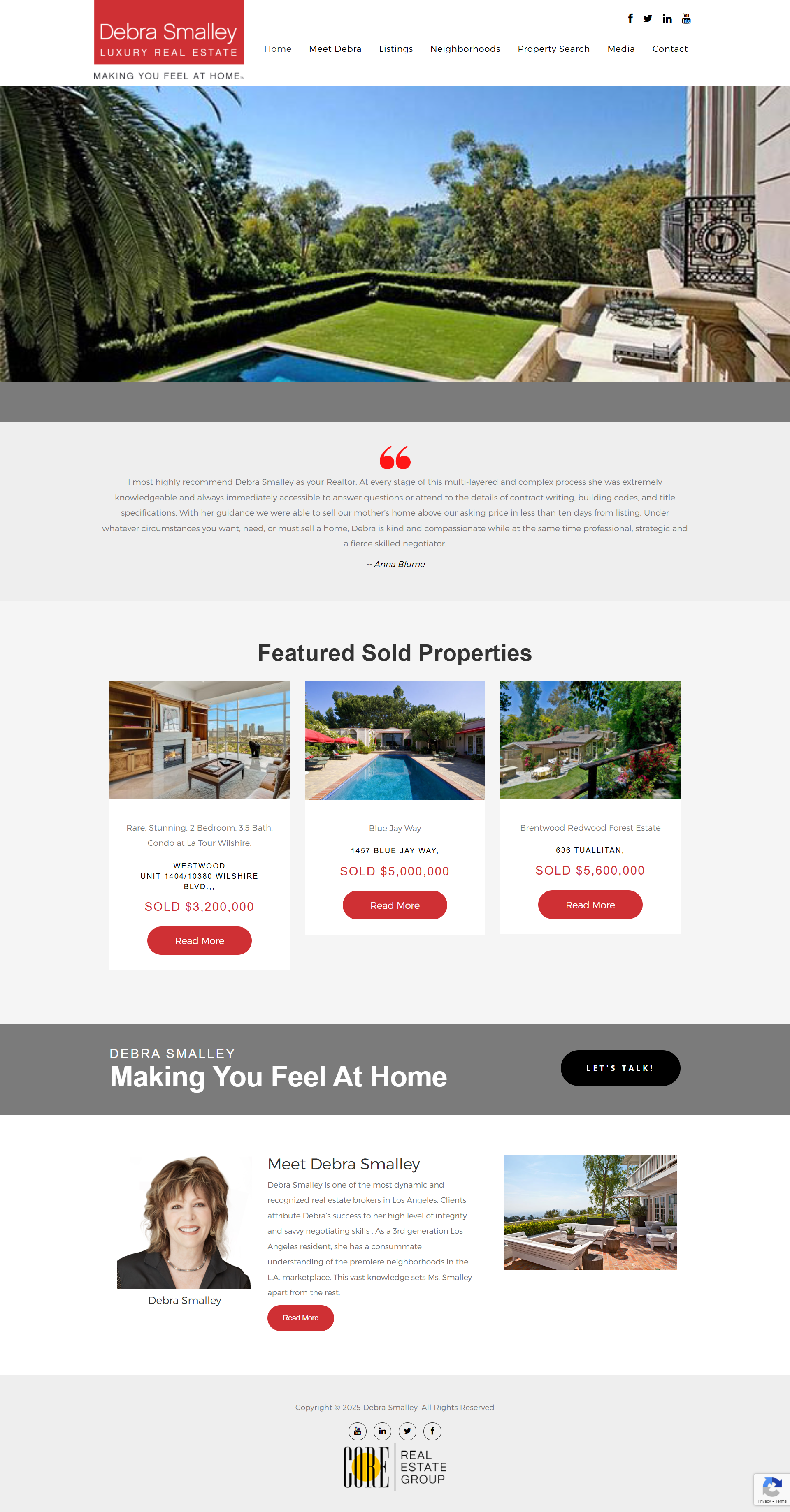
What we like about this real estate website:
- High-end property visuals.
- Detailed neighborhood guides.
- Simple, user-friendly layout.
Debra Smalley’s website is simple, elegant, and easy to browse. The great photos make the homes pop, and the neighborhood guides help buyers learn more about the area. Her website is well-organized, with clear sections for listings, community insights, and testimonials from happy clients.
For your own website, you can use quality images to create an emotional connection with visitors. Organize your site to make it easy to navigate, so users can move from browsing listings to finding local insights and reaching out to you.
4. Jennifer Ferland
A modern site that reflects Jennifer Ferland’s approachable, exclusive brand and expertise in the San Francisco Bay Area. 
What we like about this real estate website:
- Clean, minimal design.
- Video-based client testimonials.
- Comprehensive service details.
The website is warm, welcoming, and easy to explore. The layout is simple, with the right amount of detail to guide visitors. What really differs are the video testimonials, real stories from clients build instant trust. Jennifer Ferland’s real estate website explains her services in plain language, so people know exactly how she can help.
This site is an awesome example for realtors who want to present a professional, yet approachable image. It works well for agents in competitive markets who need to highlight their expertise.
5. Jade Mills Estates
Luxury real estate with a sophisticated design that highlights high-end properties and the agent’s reputation.

What we like about this real estate website:
- Elegant design.
- Positioning as a luxury brand.
- Thoughtful property presentation and layout.
Jade Mills Estates’ website is modern, refined, and brand-driven communicating her exclusiveness. It’s done through a minimal design, thoughtful wording, and large-format visuals that let each listing shine.
Property pages are nicely laid out with high-res images, detailed descriptions, and subtle design touches. The “Meet Jade” section emphasizes her legacy, awards, and global connections. It’s a great example of how strong personal branding and design can work hand-in-hand in high-end real estate. If your focus is on luxury properties and you want to position yourself as an exclusive seller, this site is worth exploring. You can learn how to use visuals and organize the site’s layout for the best impact.
6. Compass Real Estate
A modern, tech-forward platform with intuitive design and modern user experience.
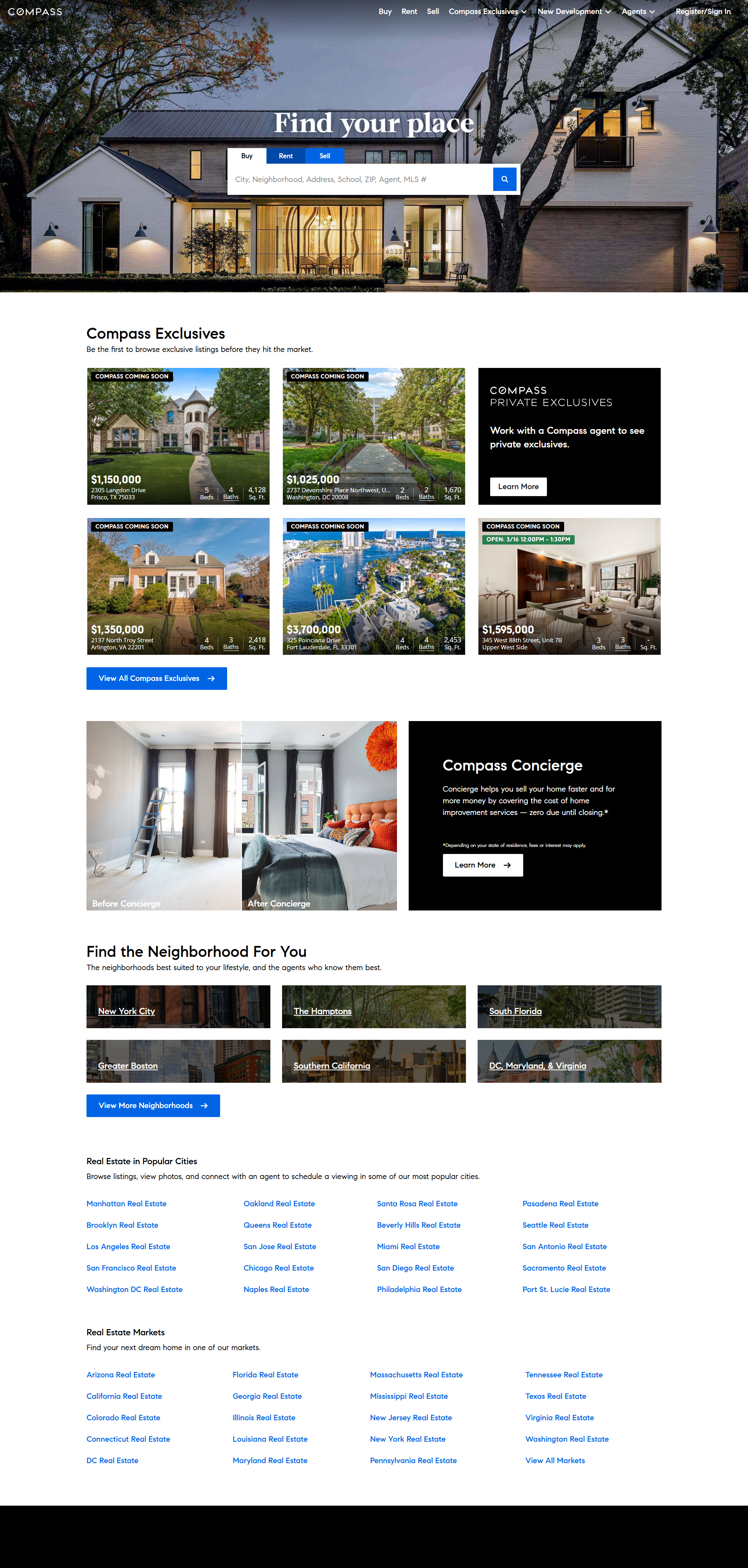
What we like about this real estate website:
- Powerful, user-friendly search tools.
- Interactive map-based browsing.
- Personalized agent and team pages.
Compass has a tech-forward approach, focusing on smart and modern technology. The search experience is quick and intuitive with the interactive map feature that lets users explore neighborhoods visually. Everything is organized for convenience for sellers, renters, and buyers alike.
Each agent has their own branded mini-site with their photo, bio, and specific listings, while still maintaining a consistent unified branding. If you are building a real estate agency website with multiple agents, this example gives insights into accomplishing it.
Compass Concierge and market insights tools make the site a complete real estate ecosystem. This shows how to combine functionality and a tech-driven brand experience.
Ready to create something similar? Try the 10Web AI Real Estate Website Builder to create a similar experience on your website. No coding or design skills are needed, now you can build your dream website by describing your business to AI.
7. Aaron Kirman
A bold, elegant website for luxury real estate in Los Angeles.

What we like about this real estate website:
- Striking luxury branding.
- AI-powered property matching.
- High-profile media and press features.
Among the premium real estate listings in Los Angeles, this is one of the most unique ones. It is full of luxurious properties, each well-photographed and detailed, providing customers with a visual understanding. The Aaron Kirman website includes great testimonials from clients, adding trust. You can learn how to display luxury properties with high-quality photos and bold design choices that appeal to luxury buyers. Notice how client testimonials help build trust, and how a clear call to action makes it easy for potential clients to reach out.
8. Dawn McKenna Group
A stylish, easy-to-use website highlighting luxury homes and the lifestyle that comes with them.

What we like about this real estate website:
- Strong, consistent branding.
- Beautiful community and lifestyle content.
- Clear agent team presentation.
The Dawn McKenna Group website combines real estate with a strong sense of place and lifestyle. They help visitors imagine what it’s like to live in each area with neighborhood pages, market insights, and stylish blog posts.
The site highlights the full team with clear agent profiles, making it feel personal and approachable. Everything from the layout to the images supports the brand’s upscale feel, but it’s still simple for visitors to explore and get in touch with. This example teaches how to highlight your team’s success and local expertise while keeping an elegant design. Pay attention to how they present their reach across multiple markets, clearly stating they are both local experts and national leaders.
9. Matt Epstein
A helpful, locally-focused website for properties in Sherman Oaks and surrounding neighborhoods.

What we like about this real estate website:
- Easy-to-use neighborhood guides.
- Informative real estate blog.
- Clean layout with bright visuals.
Matt Epstein gives a real insight into the local market. The neighborhood guides are practical and add extra value.
The blog covers useful topics like market updates and home improvement tips. The design is simple, with colorful images and an intuitive search function. It’s a strong example of a real estate website that’s informative and approachable, created for people looking to buy or sell in San Fernando Valley․
This example teaches how to use blog posts and community resources to position yourself as a local expert. Sharing real estate advice builds trust, engages visitors, and helps strengthen relationships, improving lead generation.
10. Christine Nieva
A friendly, informative website that helps buy and sell confidently in Washington, Maryland, and Virginia.

What we like about this real estate website:
- Personalized home finder tool.
- Step-by-step buyer and seller guides.
- Handy mortgage calculator.
Buying or selling a home is easier and more personal with Christine Nieva. The “Perfect Home Finder” tool helps buyers find a perfect fit for their search, while her detailed guides walk visitors through every stage of the process.
Christine Nieva also has an interactive mortgage calculator great for first-time buyers planning their budget. The CTAs are clear and the layout is easy to follow. As a takeaway, use neighborhood insights, school ratings, and real-time property listings to engage potential clients.
11. The Jills Zeder Group
Miami luxury homes and condos specialists.

What we like about this real estate website:
- Sophisticated visual design.
- Smart, user-friendly search filters.
- Detailed neighborhood and market information.
The Jills Zeder Group website is professional, reflecting their reputation as a top luxury real estate team in the US. It has attractive property photography, with an easy-to-use search tool letting visitors filter by price, property type, or number of bedrooms. The site also offers in-depth neighborhood guides and current market updates, giving buyers a clearer picture of the Miami lifestyle.
Testimonials from past clients add credibility, while well-placed calls to action help visitors quickly take the next step. This page gives an insight into how to display as many listings as possible on a single page and attract interested buyers.
12. Lux Living Estates
Dubai’s luxury and modern properties with stunning visuals and simple navigation.

What we like about this real estate website:
- Interactive property map.
- Dynamic image sliders.
- Detailed, easy-to-browse listings.
Lux Living Real Estate’s website has a big visual impact and user-centric experience. Listings have high-quality photos, dynamic sliders, and organized details that make it easy to compare and explore options.
The interactive map lets users explore Dubai’s top neighborhoods on a screen. The site also features client testimonials and smart call-to-action buttons for booking valuations or contacting agents. From this real estate website example you can pick up how to combine modern design with practical tools for a well-off audience. They also effectively use agent photos to build trust and connect with visitors; when users know who they’re working with, they feel more confident in reaching out.
Love this design? Let the 10Web AI Website Builder create a similarly stunning website for you in minutes.

Build your website in 1 minute
Found inspiration? Your website is just a few clicks away. Start
with 10Web AI Website Builder to effortlessly bring your vision to life.
13. Sandro Dazzan
A bold, visually rich website that captures Malibu’s lavish lifestyle.

What we like about this real estate website:
- Stunning video integrations.
- Strong focus on agent credibility.
- Insightful neighborhood highlights.
Sandro Dazzan feels more like a luxury experience than a standard property site. With cinematic video, everything is designed to reflect the upscale Malibu market. Instead of relying on testimonials, the site leads with Sandro’s impressive track record and national recognition, instantly building trust.
Neighborhood guides give visitors a deeper sense of place, while the layout keeps things clean and easy to navigate. This example highlights how to use bold visuals and a clean layout in luxury property sales. You can take mixing personal branding and credentials to build trust and engage high-end buyers.
14. HomeLink Properties
A practical, user-focused website built to simplify the rental experience from start to finish.
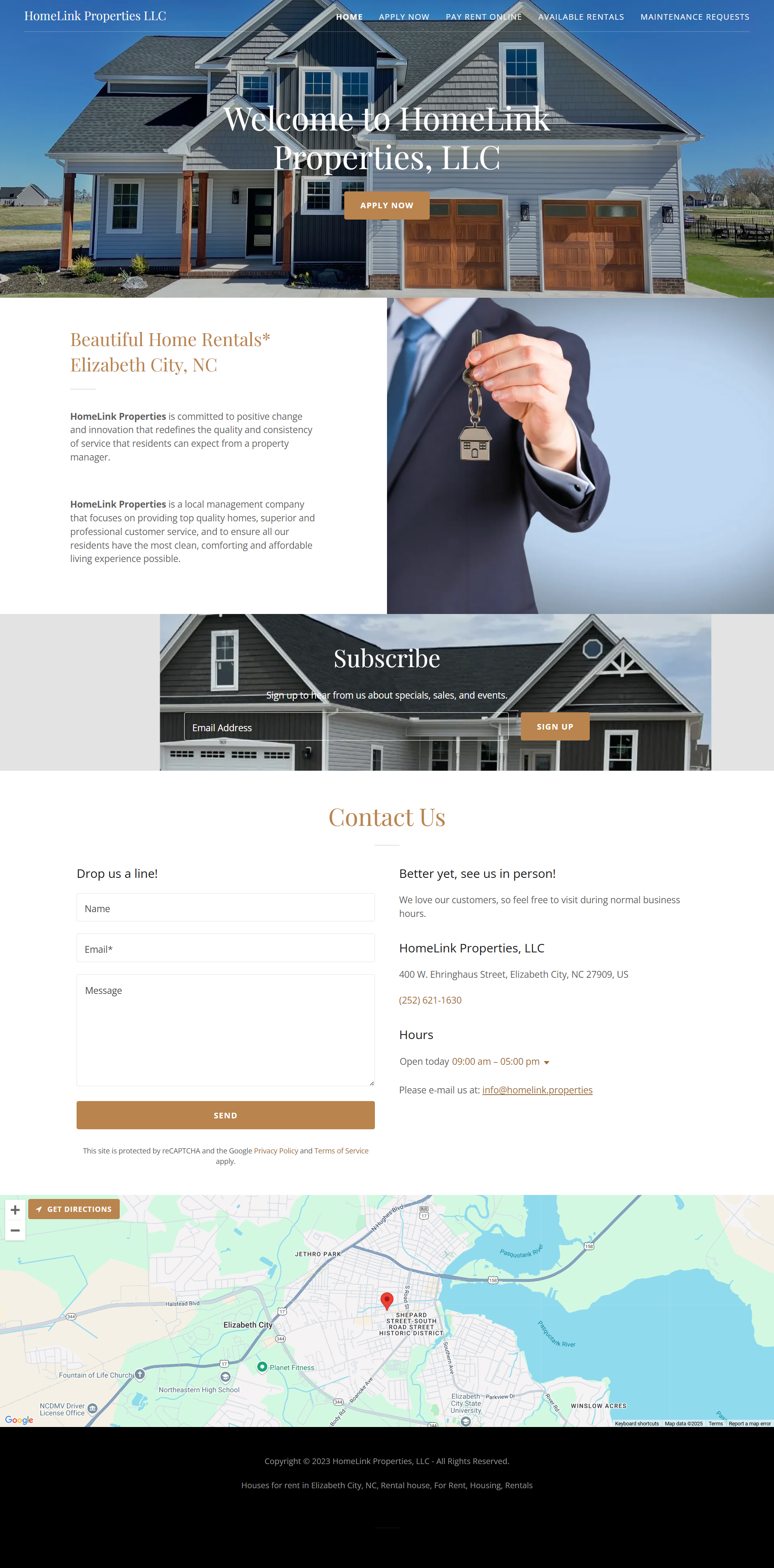
What we like about this real estate website:
- Personalized user dashboards.
- Augmented reality property views.
- Built-in walkability insights.
HomeLink Properties’ website has great functionality and user convenience. Designed with renters in mind, it offers features like custom dashboards to save searches and properties, plus the augmented reality tools give a better sense of space before visiting in person.
The “Walk Score” feature adds extra value, helping users understand how accessible the area is. The site also makes everyday tasks simple, like paying rent or submitting maintenance requests online. As a takeaway, you learn how to integrate essential tenant services; like rent payments, maintenance requests, and rental applications, directly into the site, providing an efficient experience that drives tenant engagement and satisfaction.
15. The Malibu Life
A lifestyle-driven website that captures Malibu’s energy, luxury, and coastal charm.

What we like about this real estate website:
- Strong lifestyle branding with visual storytelling.
- Video content of the team and area.
- Easy property search.
The Malibu Life website instantly pulls you into the experience of living in Malibu. The homepage features high-quality visuals and a strong personal brand presence from team lead Madison Hildebrand, a well-known name in luxury real estate. The focus on lifestyle makes this site distinct, there’s content about beaches, dining, community, and the real vibe of Malibu.
The property search tool makes browsing easy, while video intros and team profiles add warmth and personality. This real estate site sells both homes and a way of life. From them, you can learn how to effectively showcase your team’s achievements, client testimonials, and properties while using a clean layout that makes navigation simple.
16․ Beach & Bartolo Realtors
A community-rooted website that reflects this team’s deep local knowledge and personalized approach.
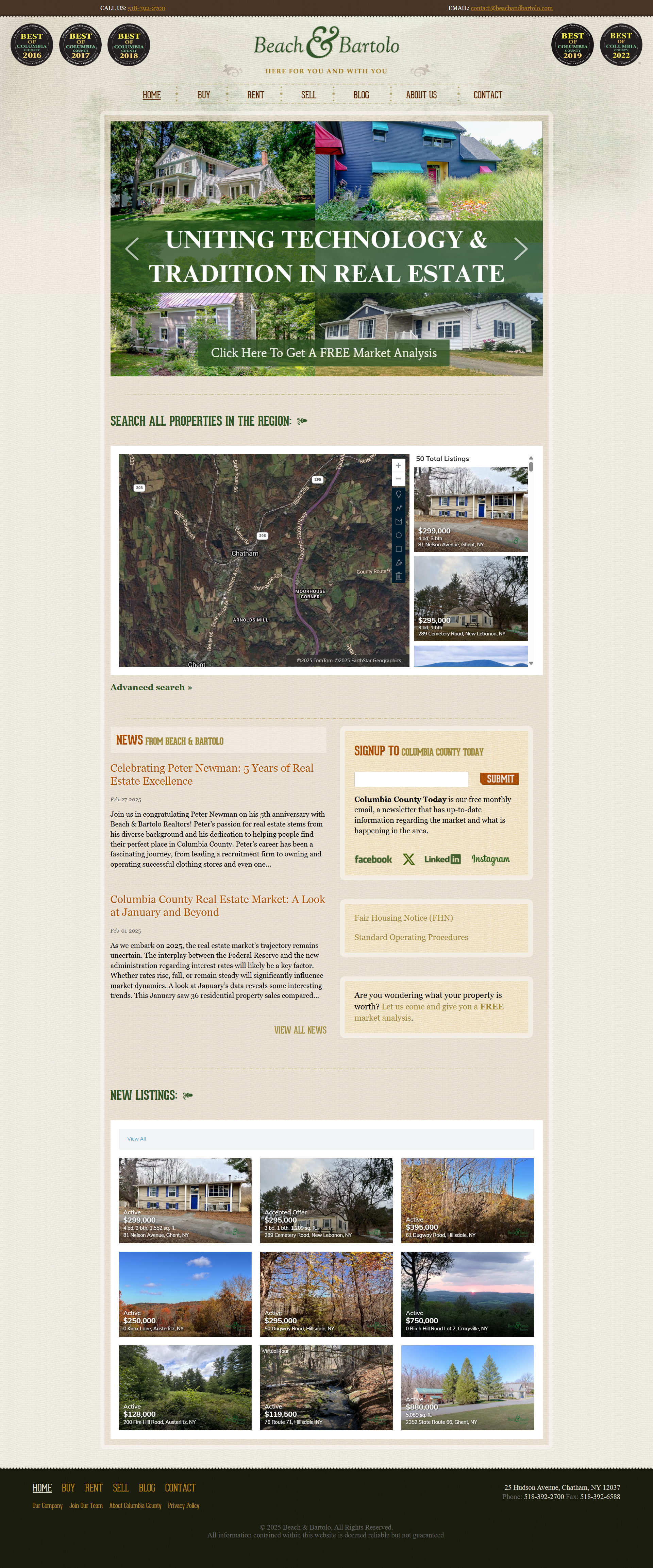
What we like about this real estate website:
- Emphasis on local community life.
- Approachable language.
- Simple yet effective search.
The Beach & Bartolo website is welcoming, much like the community it serves. Instead of focusing solely on listings, the site highlights what makes living in the Berkshires special, i.e. local charm, welcoming neighborhoods, and a lifestyle that blends nature with culture.
The agent bios on the Beach & Bartolo website are an important feature, giving visitors a real sense of the team’s personality and connection to the area. The property search is easy to use, with intuitive filters and helpful layouts. This is a great example of a real estate website that builds trust through authenticity and community-driven content. The most useful takeaway is mixing personal storytelling and highlighting the unique aspects of a location to connect with visitors. It creates a deeper sense of trust and engagement beyond just property listings.
17. Carver County Experts
A user-friendly, locally focused website highlighting the team’s deep expertise in Carver County.

What we like about this real estate website:
- Hyper-local focus.
- Helpful resources.
- Engaging blog content.
The Carver County Experts website truly owns its niche: everything is customized for buyers and sellers looking specifically in Carver County. From detailed community spotlights to property search tools that let users filter by school district or neighborhood, the site connects people to the area.
The homepage includes helpful tools like home valuation, mortgage calculators, and buyer/seller guides, making it practical and inviting. The blog adds a personal, educational touch with updates and insights relevant to local market trends. You can learn how to use intuitive property search tools, offer instant listing alerts, and provide market reports to keep visitors engaged.
18. The Fridman Group
A luxury-driven website that shows The Fridman Group’s status as a powerhouse in ultra-high-end real estate.

What we like about this real estate website:
- Striking cinematic visuals.
- Clear branding around celebrity and luxury lifestyle.
- Sophisticated press and media integration.
The Fridman Group’s website makes an immediate impression; it’s dramatic, and clearly built for a high-net-worth audience. The full-screen visuals and elegant animations highlight jaw-dropping properties in Beverly Hills, Bel-Air, and beyond.
The site emphasizes luxury by displaying the group’s high-profile press features, celebrity clientele, and multimillion-dollar sales history. The navigation is clean and modern, while key CTAs like “Schedule a Consultation” or “Browse Listings” guide visitors through a refined experience. From this example, you can learn how to effectively highlight exclusive properties across multiple locations and maintain a luxurious feel.
19. True Homes
A vibrant website helping clients navigate the Raleigh-Durham real estate market.
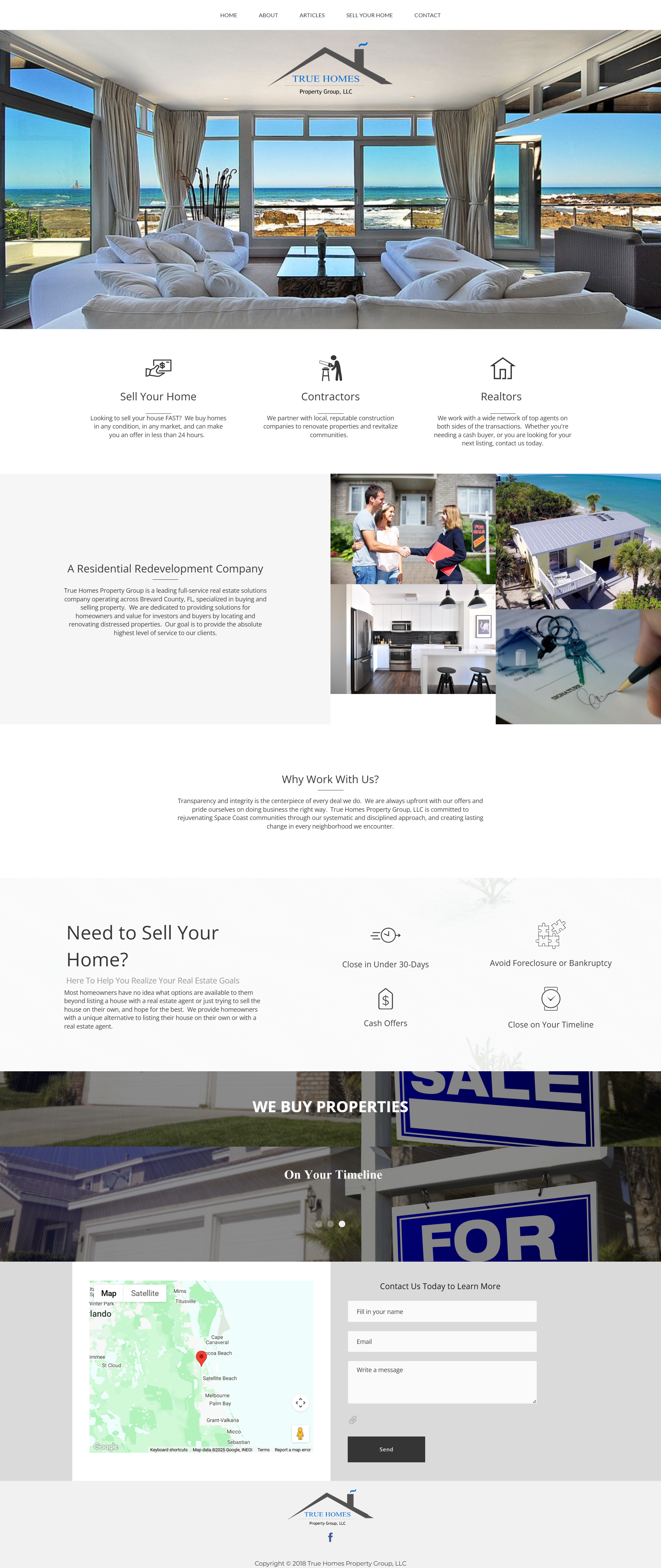
What we like about this real estate website:
- Friendly branding.
- Educational content.
- Simple, user-friendly property search.
True Homes Property Group’s website has a welcoming tone and helpful resources for buyers and sellers. The design is clean, bright, and easy to use. What makes this site different is its strong educational approach; offering downloadable homebuyer and seller guides, tips, and local insights that empower clients to make informed decisions.
The search functionality is intuitive and accessible, with quick filters based on neighborhoods, prices, and property types. You can learn how to market alternative solutions, like buying homes as-is or avoiding foreclosure, to cater to clients in unique situations.
How to create your real estate website
So you’ve seen the examples and now you’re thinking, “Okay, I want something like that… but where do I even start?”
Are you a real estate agent trying to get your name out there, a designer building a site for a client, or an entrepreneur exploring the real estate niche? The idea of actually building the site can feel like the hardest part. Tech overwhelm. Too many tools. Not enough time. Or worse, what if you pick the wrong platform and waste weeks?
More than selling a house, a real estate agent’s core mission is to help families find their homes and start an exciting chapter in their lives. A great real estate website helps people picture their life, not just a property.
You don’t have to be a tech pro or spend ages designing it from scratch. With the right tools, you can easily launch a website that reflects who you are, builds trust with your clients, and connects you with the people you want to help.
10Web AI Website Builder lets you create a real estate website just like the ones you’ve seen in this list. 10Web is an AI-powered platform that helps real estate agents build stunning, functional websites without any hassle.
All you need to do is tell the AI about your business—what you do, who you serve, and what kind of properties you offer—and it will instantly generate a personalized website with all the essential pages, like Home, Listings, About, and Contact.
Here’s how to create your realtor website in just a few steps:
- Go to 10Web.io > provide your business name > describe it in a few words > click Generate Your Website.
- Review the Website name, description, and structure.
- Click Next > choose the website colors, fonts, and styles.
- Click Generate to apply.
Once your website is live, you can customize everything from colors and fonts to layout and content using the website editor based on Elementor and the chat-based AI Co-Pilot.
A handy checklist for a great real estate website
After looking at dozens of high-performing real estate websites, we started noticing patterns: simple, smart elements that show up again and again. Both for agents building their own sites and designers creating realtor websites for a client, this checklist will help focus on what really matters.
- The website should always work, capture leads, and provide clear CTAs.
- Show properties to make buyers feel they’re experiencing the property in person.
- Make property search effortless with a fast, easy-to-use search tool.
- Display trust-building content like testimonials and recent sales.
- Include local info like school ratings, walkability scores, and neighborhood guides.
- Add blog posts, FAQs, and guides to educate buyers and sellers.
- Optimize your site with relevant real estate keywords, and ensure it’s mobile-friendly, and fast.
- Include IDX (Internet Data Exchange): a tool that allows real estate websites to display listings from a local Multiple Listing Service (MLS).
- Add CRM integration to capture, track, and manage leads, converting prospects into clients.
Conclusion
If there’s one thing all these real estate website examples have shown us, is the website has to work for you, your audience, and your goals.
A great real estate website creates connection, trust, and an experience that helps buyers and sellers feel confident from the very first click. As we’ve seen in these top examples, the best sites combine smart design with intuitive features, local insights, and personal touches that set agents apart in a competitive market.
Be it showcasing luxury estates, helping first-time buyers, or managing rentals, your website can (and should) be your most powerful business tool. If you’re ready to take your online presence to the next level, let 10Web help you turn your vision into a high-converting reality.
Create your dream website with 10Web AI Website Builder 
Build your website in 1 minute
and take your business online!









